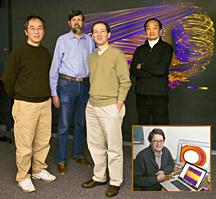- Number 306 |
- March 1, 2010
PPPL scientists awarded 111 million hours of supercomputing time

From left are PPPL scientists Weixing
Wang, David Mikkelsen, Stephane
Ethier, and William Tang with a plasma
turbulence simulation in the background.
Not pictured is W. W. Lee. Inset: PPPL
scientist Greg Hammett.
Four research projects involving six scientists at DOE's Princeton Plasma Physics Laboratory (PPPL) have been awarded a total of 111 million processor hours on supercomputers at DOE's Argonne National Laboratory and Oak Ridge National Laboratory (ORNL). The researchers will be using the time for fusion energy-related research regarding plasma turbulence simulations. Plasma is a hot, gaseous state of matter used as the fuel to produce fusion energy—the power source of the sun and other stars.
The PPPL projects are among 69 receiving a total of 1.6 billion supercomputing processor hours through the 2010 Innovative and Novel Computational Impact on Theory and Experiment (INCITE) program for large-scale, computationally intensive projects. The DOE recently announced these awards for thirty-four new and 35 renewal projects to have access to some of the world's most powerful supercomputers at DOE national laboratories. This is the seventh year the INCITE program has awarded time on DOE supercomputers to universities, laboratories, other government agencies and industry.
"Computation and supercomputing are critical to solving some of our greatest scientific challenges," said Energy Secretary Steven Chu. "This year's INCITE awards reflect the enormous growth in demand for complex modeling and simulation capabilities, which are essential to improving our economic prosperity and global competitiveness."
Physicists Stephane Ethier, Greg Hammett, W.W. Lee, David Mikkelsen, William Tang, and Weixing Wang are the PPPL scientists involved in projects awarded. "These awards focus on the grand challenge problem of understanding turbulence in plasmas at small spatial scale and how it influences behavior of a large, hot fusion plasma. This understanding will affect our progress toward fusion, but have impact for turbulent behavior in other venues, such as astronomical plasma," said PPPL Director Stewart Prager.
Submitted by DOE's Princeton Plasma Physics Laboratory
